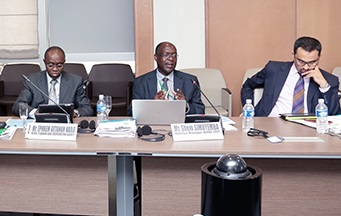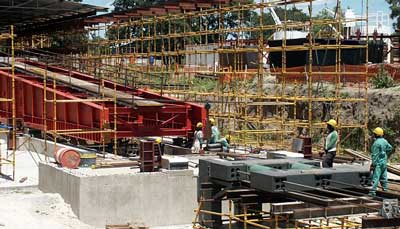
Country-linked digital hub to advertise finance-ready bankable infrastructure projects

Regional information hubs where each country can promote bankable projects in its territory, are proposed by the Infrastructure Project Preparation Facility (IPPF), a division under NEPAD.
“It would be both a ‘project hub’ and a ‘help desk’ – a centralized IT platform for bankable projects which potential investors can access. Such a hub could be housed by the African Development Bank to ensure credibility and confidence by both project owners (governments) and potential investors,” said Shem Simuyemba, the Coordinator for the NEPAD project preparation facility.
The fundamental idea is to develop a pipeline of bankable infrastructrue projects three years in advance. Each country should then have it own window linked to the hub to advertise investment opportunities in large infrastructure projects.
At a Project Financing Roundtable arranged earlier this year by international law firm, Baker and Mckenzie, investors stressed the absence of bankable invesment-ready projects in African countries.
During the discussions, it was noted that the appetite to invest depended on risk considerations which are very different depending on whether the investor is a Development Finance Institution (DFI), a project developer or a private investor.
“To achieve this requires considerable scaling-up of capacities and resources for project preparation and development. This is a space largely neglected in terms of resources even though it has been demonstrated that every one dollar committed to project preparation and development unlocks between US$80 and US$100 in investment financing. Thus, a project with US$10 million in preparation costs can unlock between US$800 million and US$1 billion in financing depending on the sector and project location,” Simuyemba explained.
“The ‘one-stop-shop’ initiative would not just be a listing of projects, but a differentiation of the ‘financial-readiness’ of the projects in terms of all the key returns that investors look for: assurance of transparent procurement practices, tenure, risk, returns, availability of co-financing, depth of local capital markets, among others” he said.
“The important point to remember is that projects need to be bankable from the point of view of the person who will provide the risk capital to make the project happen. While bankability is about figures, it is also about risk and reality and these factors all go together in making an investment decision,” Simuyemba said.
He stressed the need for bankable investment opportunities in Africa to be unlocked to attract regional and international investors adding that Africa still does not have trans-continental investors.
This is attributed to a number of factors, among which is a history of state monopolies which crowded out the private sector and stifled its growth; heavily controlled and regulated sectors particularly in infrastructure – which did not have the necessary enabling environment and incentives for private sector participation; as well as weak capital markets.
Simuyemba outlined three other measures to be taken to achieve this.
The first is the liberalization of sectors which are still dominated by government like communication, transport and energy.
“The second is the need to scale-up capacity for project preparation and development as this is the only means to assess, package and structure the projects in such a way that there is a ‘rolling pipeline’ of bankable projects” he explained.
In the third instance, he named the importance of regional markets which need to be created through deliberate policy reforms, an enabling environment, incentives and strengthened partnerships.
“Most African countries are too small to be attractive markets for major infrastructure investments or even major industries. While there was a lot of debate related to the lack of political will in the past, African countries have more recently shown a new resolve by undertaking bold reforms and also reaching consensus on major African Union (AU) continental initiatives such as the Programme for Infrastructure Development in Africa (PIDA), the Continental Free Trade Area (CFTA) and the African Development Bank’s High 5’s.”
“There has been much talk about Sovereign Wealth Funds, Pension and Insurance Funds, and other institutional investors investing in infrastructure in Africa, but this has not happened to the scale envisaged. These institutional investors have not been guided to the right types of projects tailored to their specific profiles and financing needs and given the massive resources in these institutions, this gap needs to be bridged as a matter of urgency to unlock these funds for the much-needed infrastructure investments on the Continent.”
The NEPAD Infrastructure Project Preparation Facility (NEPAD-IPPF) is a multi-donor Special Fund hosted by the African Development Bank. It supports African countries to prepare regional infrastructure projects in energy, transport, ICT and transboundary water to make them bankable for investment.










































